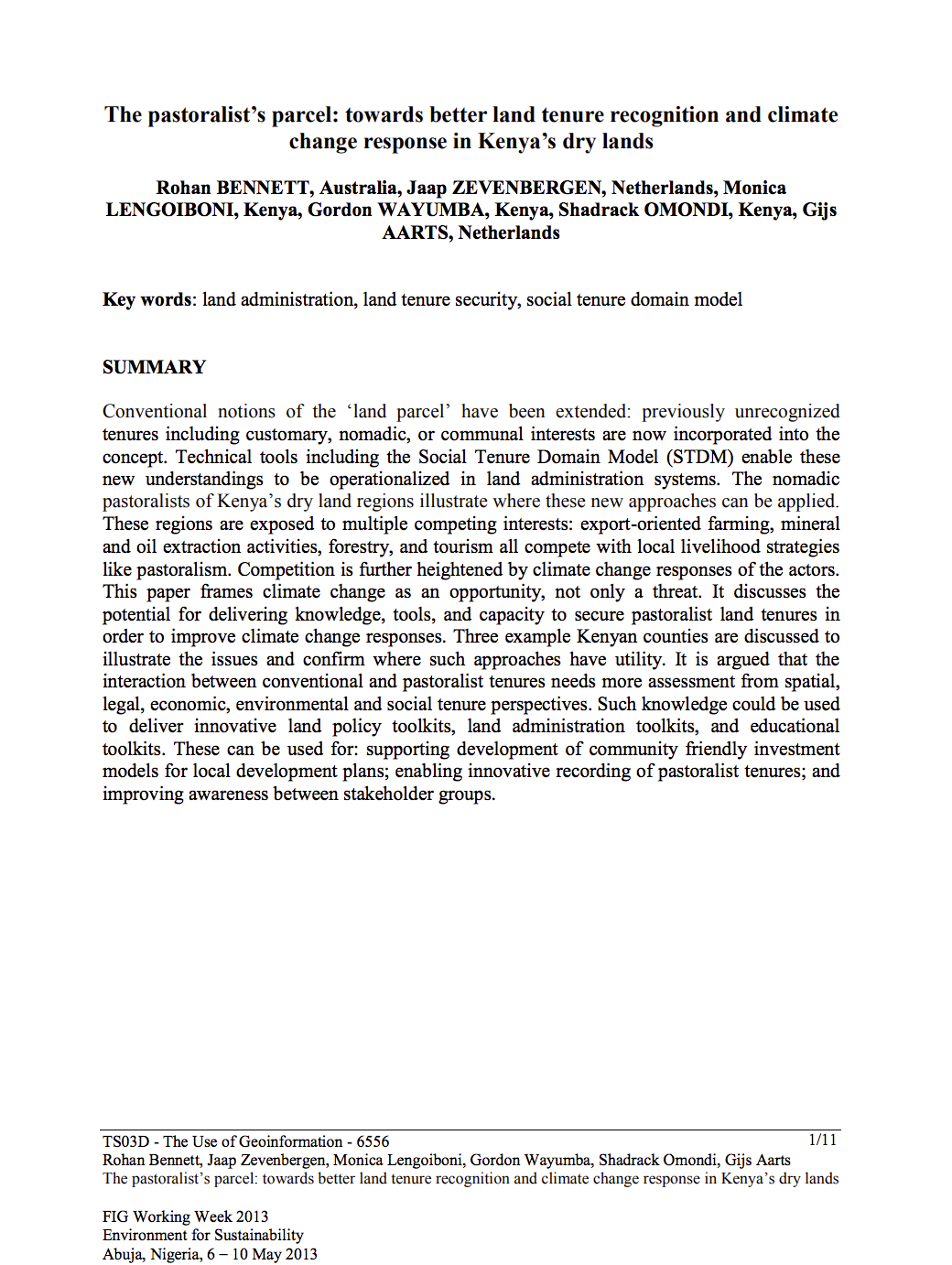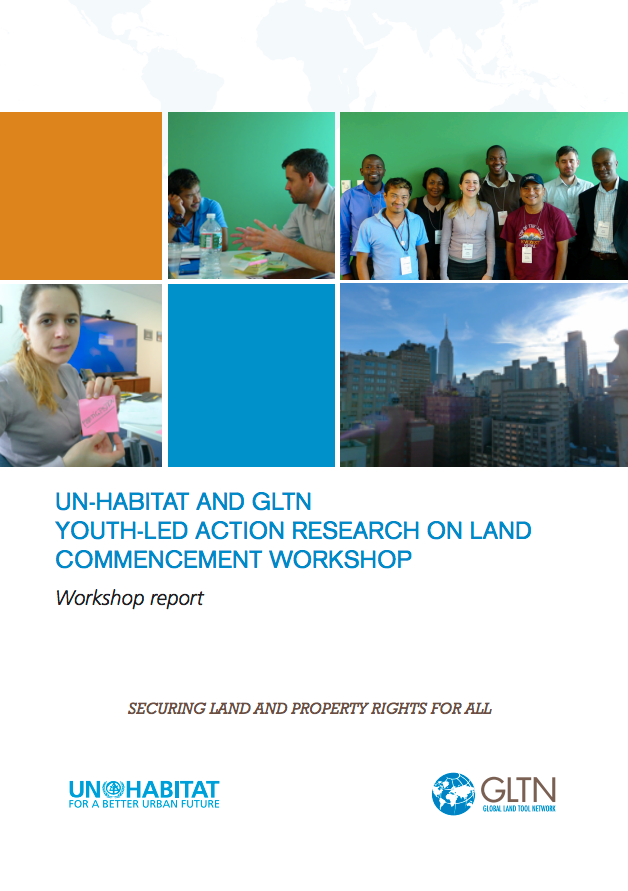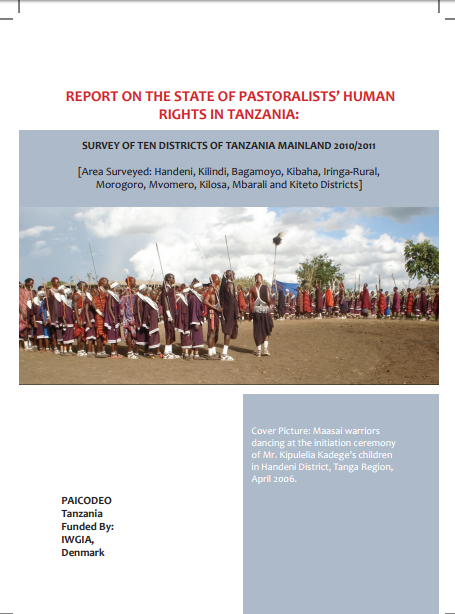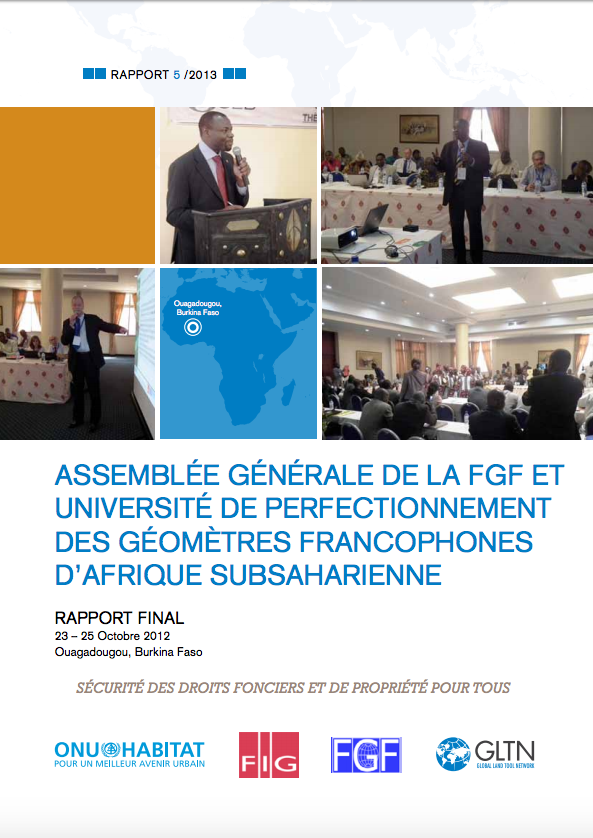The pastoralist’s parcel: towards better land tenure recognition and climate change response in Kenya’s dry lands
Conventional notions of the ‘land parcel’ have been extended: previously unrecognized tenures including customary, nomadic, or communal interests are now incorporated into the concept. Technical tools including the Social Tenure Domain Model (STDM) enable these new understandings to be operationalized in land administration systems. The nomadic pastoralists of Kenya’s dry land regions illustrate where these new approaches can be applied.
Securing Livelihoods and Land Tenure in Rural Myanmar
Executive Summary: "In the context of transition to a more open form of
government, the Myanmar government has
begun to liberalize land markets and, in 2012, enacted two major land-related laws.
Implementing these new land laws has proven challenging, however, as it has been difficult to
integrate these laws with the existing customary practices of various ethnic minorities. To
address these and other issues UN-HABITAT Myanmar is assisting the Myanmar government in
developing a
Land Administration and Management Program
(LAMP).
Village land use planning in rangelands in Tanzania: good practice and lessons learned
This Issue Paper No.3 is part of the series Making Rangelands Secure, a learning initiative supported by ILC, IFAD, RECONCILE, IUCN-WISP and Procasur. The Making Rangelands Secure Initiative has been established by a group of organisations seeking to improve security of rights to rangelands. The initiative seeks to identify, communicate and build good practice on making rangelands secure for local rangeland users.
Rampant Land Confiscation Requires Further Attention and Action from Parliamentary Committee
This past week the parliamentary Farmland Investigation Commission submitted its report on land confiscation to the parliament. The report finds that the military have taken almost 250,000 acres of land from villagers. The commission stated that they had spoken to military leaders about the confiscation, “Vice Senior-General Min Aung Hlaing […] confirmed to me that the army will return seized farmlands that are away from its bases, and they are also thinking about providing farmers with compensation.”...
Military Involved in Massive Land Grabs: Parliamentary Report
RANGOON—Less than eight months after a parliamentary commission began investigating land-grabbing in Burma, it has received complaints that the military has forcibly seized about 250,000 acres of farmland from villagers, according to the commission’s report.
The Farmland Investigation Commission submitted its first report to Burma’s Union Parliament on Friday, which focused on land seizures by the military.
Losing Ground: Land conflicts and collective action in eastern Myanmar
Analysis of KHRG's field information gathered between January 2011 and November 2012 in seven geographic research areas in eastern Myanmar indicates that natural resource extraction and development projects undertaken or facilitated by civil and military State authorities, armed ethnic groups and private investors resulted in land confiscation and forced displacement, and were implemented without consulting, compensating or notifying project-affected communities.
UN-Habitat and GLTN Youth-Led Action Research on Land Commencement Workshop Report
The land challenge is central to the broader youth dynamics of migration, employment, livelihoods and belonging. The more than 1.8 billion youth living worldwide represent not only a land challenge, but an untapped potential in moving the tenure security agenda forward. Recognizing this, the Global Land Tool Network has partnered with UN-Habitat to develop youth responsive land tools through the Youth-led Action Research on Land program. Five action research projects will be undertaken by youth organizations in Brazil, Kenya, Nepal, Yemen and Zimbabwe.
Report on the State of Pastoralists' Human Rights in Tanzania: Survey of Ten Districts of Tanzania Mainland 2010/2011
This report highlights some of the human rights challenges which the Indigenous peoples in Tanzania, particularly Maasai pastoralists, are facing. It also proposes some areas of improvement in order to make Tanzania a better place for everyone, including indigenous pastoralists. It should be noted that Tanzania has more than 120 different ethnic groups, which are Bantu-speaking, Nilo-hamitic (including the Maasai) and Cushitic.
Assemblée Générale de la FGF et Université de perfectionnementdes Géomètres Francophones d’Afrique Subsaharienne (Ouagadougou Report)
En marge de l’Assemblée Générale de la Fédération des Géomètres Francophones (FGF), ONU-Habitat et le Réseau Mondial des Instruments Fonciers (GLTN), a organisé une séance de formation sur la bonne gouvernance foncière.
Cette rencontre technique et scientifique a réuni 130 experts géomètres, du secteur privé, du secteur public, enseignants, étudiants, venus de 13 pays d’Afrique Subsaharienne et d’Europe.
Guide de médiation foncière: Basé sur l’Expérience de l’Est de la République Démocratique du Congo
Le Guide de mediation fonciere s'inspire surtout de l'experience pratique de terrain du programme foncier tel que mene par ONU-Habitat a l'Est de la Republique Democratique du Congo, notamment au Nord Kivu, Ituri et Sud Kivu. Il se refere par endroit aux experiences d'autres pays en situation de post-conflits. Ce guide propose des etapes concretes et des outils utilises lors du processus de mediation fonciere. Le role et responsabilites des acteurs et ‘beneficiaires' de la mediation sont aussi decrits. Les principes et fondements d'une bonne mediation sont mis en exergue.









